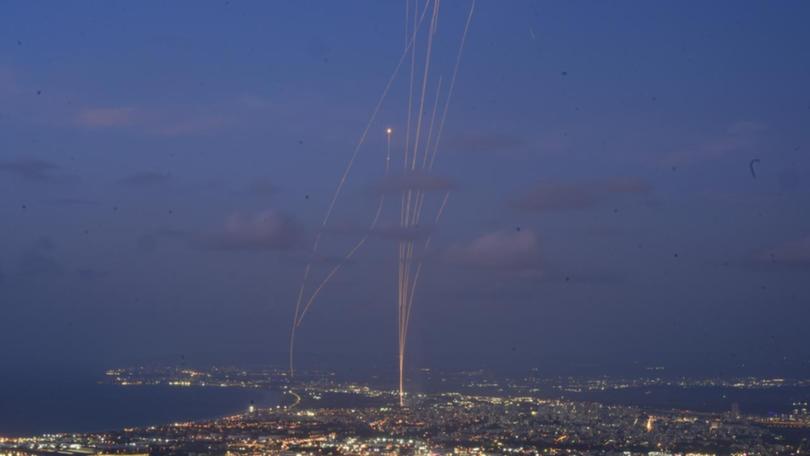Hezbollah hits Haifa, Israel hits 120 targets in Lebanon as Middle East conflict spirals
As Israel's port town of Haifa is targeted with scores of missiles, its military has ramped up strikes on southern Lebanon where the conflict is spiralling.

Hezbollah has fired rockets at Israel’s third largest city Haifa as Israeli forces looked poised to expand ground raids into south Lebanon on the first anniversary of the Gaza war, which has spread conflict across the Middle East.
Iran-backed Hezbollah, an ally of Hamas, the Palestinian militant group fighting Israel in Gaza, said it targeted a military base south of Haifa on Monday with “Fadi 1” missiles and launched another strike on Tiberias, 65 km away.
Hezbollah said it targeted areas north of Haifa with missiles later in the day.
Sign up to The Nightly's newsletters.
Get the first look at the digital newspaper, curated daily stories and breaking headlines delivered to your inbox.
By continuing you agree to our Terms and Privacy Policy.Israel’s military said around 135 projectiles had entered Israeli territory as of 5pm local time. Ten people were reported injured in the Haifa area and two others further south in central Israel.
Israel’s military said the air force was carrying out extensive bombings of Hezbollah targets in south Lebanon, and that two Israeli soldiers were killed in border-area combat, taking the military death toll inside Lebanon so far to 11.
Lebanon’s health ministry claimed 10 firefighters were killed in an Israeli air strike on a municipal building in the border-area town of Bint Jbeil, and that other aerial attacks on Sunday killed 22 people in southern and eastern Lebanese towns.
The Israeli military has described its ground operation as “localised, limited and targeted” but it has steadily increased in scale since it began last week.
On Monday, the military said soldiers from its 91st Division had moved into southern Lebanon after a year of operations in northern Israel, where Israeli forces have been engaged in cross-border fire with Hezbollah for the past year.
Last week, the military said regular armoured and infantry units had moved into Lebanon after commando units crossed the border a day earlier.
It has not confirmed precisely where the troops are operating but it has said there were no plans to send them deep into Lebanon and that their aim was to clear border areas where Hezbollah fighters have been embedded.
Also on Monday, around 100 Israeli fighters carried out a wave of strikes, hitting 120 targets in southern Lebanon within the space of an hour, including Radwan special forces units, Hezbollah’s missile force and its intelligence directorate.
“This operation follows a series of strikes aimed at degrading Hezbollah’s command, control, and firing capabilities, as well as assisting ground forces in achieving their operational goals,” the military said in a statement.
The spiralling conflict has raised concerns that the United States, Israel’s superpower ally, and Iran will be sucked into a wider war in the oil-producing Middle East.
Iran launched a barrage of missiles at Israel on October 1. Israel has said it will retaliate and is weighing its options. One possible target is Iran’s oil facilities.
An Israeli military statement said five rockets were launched towards Haifa, also a major Mediterranean port, from Lebanon and interceptors were fired at them.
“Fallen projectiles were identified in the area. The incident is under review,” it read.
It said 15 other rockets were fired inland at Tiberias in Israel’s northern Galilee region, some of which were shot down. Israeli media said five more rockets hit the Tiberias area later.
Hamas, which triggered the Gaza war with a surprise attack on Israel a year ago, meanwhile targeted Israel’s commercial capital Tel Aviv with a missile salvo, the group said, setting off sirens in central areas of the country.
Many Israelis have regained confidence in their long-vaunted military and intelligence apparatus after a series of deadly blows to the command structure of Hezbollah, Iran’s most formidable Middle East proxy force, in Lebanon in recent weeks.
“Our counter-attack on our enemies in Iran’s axis of evil is necessary for securing our future and ensuring our security,” Israeli Prime Minister Benjamin Netanyahu said at a special cabinet meeting in Jerusalem marking the Gaza war anniversary.
“We are changing the security reality in our region, for our children’s sake, for our future, to ensure that what happened on October 7 does not happen again.”
